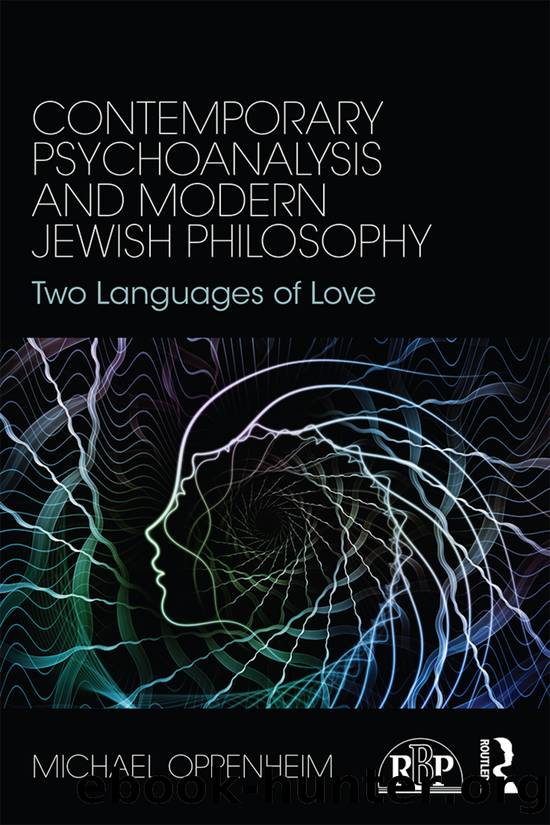Contemporary Psychoanalysis and Modern Jewish Philosophy by Oppenheim Michael

Author:Oppenheim, Michael
Language: eng
Format: epub
Publisher: Taylor & Francis (CAM)
Chapter 4
Langue, Parole, et Chanson
On Language
While the semiotic and discursive aspects of language are significant and intriguing, it may well be that other dimensions of this global phenomenon we call language reveal more about the depth and possibilities of human living. At least, this appears to be the conclusion shared by some post-Freudian psychoanalysts and modern Jewish philosophers of encounter. The main figures participating in this dialogue are the American psychoanalysts Hans Loewald, Stephen Mitchell, and Thomas Ogden, and the German Jewish philosophers Franz Rosenzweig and Martin Buber, as well as the French Jewish philosopher Emmanuel Levinas. Particularly on the psychoanalytic side, a number of other thinkers will be introduced.
These thinkers can be seen to suggest that Ferdinand de Saussureâs famous discussion of language as langue and parole, that is, as system and performance, fails to capture its sensory, affective, formative, dialogical, ethical, and even metaphysical dimensions, which come to the fore in human relationships. Many of these elements are evoked by the metaphor of âsongâ (chanson).
This exploration of the promises and actualities of language will be pursued by way of a dialogue between the psychoanalysts and philosophers. They represent two very different approaches or discourses, but in terms of this particular study they neither contest nor conflict. The inexhaustible features of language allow sometimes overlapping and sometimes diverging insights to augment each other. Just as a single song calls for another rather than silencing the next, the insights of these thinkers build upon one another. Since the scope of this topic in the two discourses is so vast that a systematic treatment would necessitate tomes, using a lighter touch, the following discussion will introduce and play with striking illustrations that hopefully build into a song, a duet.
This dialogue is grounded in the shared insight that persons cannot be understood as either autonomous minds or isolated individuals. Stephen Mitchell writes that âan individual human mind is an oxymoron; subjectivity always develops in the context of intersubjectivityâ (2000, 57), and Franz Rosenzweig sees conversation as illustrating the truth that we are âdependent on the other for what is oursâ (1999a, 87). More poignantly both the psychoanalysts and the philosophers insist that the intersubjective or interhuman grounds identity, growth, meaning, and authenticity. Perhaps more than any other human activity, language exemplifies the fullness of humansâ lives together.
We will begin by briefly putting this discussion into the context of the wider linguistic turn identified in so many of the contemporary human sciences. The foray will continue and narrow by examining why the psychoanalysts and the philosophers see language as the key to understanding persons. The treatment of the psychoanalysts will progress through the themes of the sensory, affective, and formative dimensions of language, as well as the linguistic ambience of analysis. The tour of the philosophersâ terrain will include the dynamics of dialogue, ethics, and the divine, finishing with an exegesis on scripture/text. The concluding section will compare the powers and limits of each of the two contributions to our understanding of the place of language in our existence.
Download
This site does not store any files on its server. We only index and link to content provided by other sites. Please contact the content providers to delete copyright contents if any and email us, we'll remove relevant links or contents immediately.
| Administration & Medicine Economics | Allied Health Professions |
| Basic Sciences | Dentistry |
| History | Medical Informatics |
| Medicine | Nursing |
| Pharmacology | Psychology |
| Research | Veterinary Medicine |
Bioenergetica by Alexander Lowen(1122)
Noise: A Flaw in Human Judgment by Sunstein Cass R. & Sibony Olivier & Kahneman Daniel(968)
The Data Detective by Tim Harford(940)
The Child in You by Stefanie Stahl(882)
Chatter by Ethan Kross(797)
The Science of Rapid Skill Acquisition by Peter Hollins(637)
Freedom by Sebastian Junger(630)
No Bad Parts by Richard C. Schwartz(600)
The Montessori Baby by Simone Davies(561)
Evolution Gone Wrong: The Curious Reasons Why Our Bodies Work by Alex Bezzerides(559)
The Quantum Psychiatrist: From Zero to Zen Using Evidence-Based Solutions Beyond Medication and Therapy by Biswas Dona(551)
Maps of Meaning: The Architecture of Belief by Jordan B. Peterson(549)
The Science of Self-Learning: How to Teach Yourself Anything, Learn More in Less Time, and Direct Your Own Education (Learning how to Learn Book 1) by Peter Hollins(519)
Anxiety For Dummies by Charles H. Elliott & Laura L. Smith(512)
Sadomasochism and the BDSM Community in the United States by Stephen K. Stein(497)
Disconnected by thomas Kersting(480)
Why Sex Doesn't Matter by Olivia Fane(480)
The Mechanics of Passions: Brain, Behaviour, and Society by Alain Ehrenberg(480)
Jung - The Key Ideas: Teach Yourself (TY Philosophy) by Ruth Snowden(467)
